30Under30 Honouree: Anna Parker

Great to hear from Global 30 Under 30 Honouree, Anna Parker, who is a Senior Audience Research Executive at BBC World Service.

How did you get into the industry and reach this point?
After finishing university, I wasn’t too sure what I wanted to do, but I saw jobs in Market Research and thought that it looked really interesting. I was directed to the MRS website and reached out to every company who was listed there with my CV and a cover letter. Thankfully a company called YouthSight kept me on file and asked me to interview for an internship a couple of months later.
I started working at YouthSight on a temporary basis, which turned into a year with the company, and then another two years once they were acquired by Savanta. I worked with a wide variety of clients, from youth charities to luxury fashion brands, which I am really grateful for! I then joined the BBC World Service Audiences team as I was really interested in doing more international research, and learning more about the BBC’s global audience.

Why should someone consider a career in market research, data and insights?
Having worked both agency and client side, there are many reasons to consider a career in market research! I really enjoyed working at an agency as it meant I learned a lot about different companies and industries, and the different business problems they were looking to solve through research. In every project you learn something new and you develop many different skills, including presenting, research design and data analysis.
Client side, I have now learned more about how to deliver research with impact. It’s really rewarding to see tangible changes being made off the back of the research that we do, and audiences being at the centre of decision making.
In both roles, the core is understanding people, and it is so interesting when research can join the dots to provide the context behind audience attitudes and behaviours.

Career paths are rarely without challenges. Can you share a moment from your career when things didn’t go to plan, but the lessons learned remain with you to this day?
When I was quite new to research, we were working on a large qualitative research project. We realised halfway through the research that we needed to change the scope and design of the research based on what was coming out so far. The lead in my team directed this in such an organised and calm way that it really stuck with me as a clear example of how to act in these situations, a situation which for me felt quite stressful. Ultimately, the best thing to do was to take stock and have collaborative and honest discussions with the client, and I think the research was much better for it as a result.

What two things should junior researchers focus on as they progress in their careers?
Learning as much as possible, and the best way to do this is by putting it into practice and looking at previous examples! I am very grateful for opportunities I was given to get stuck in with things, whether it is presenting or leading on a project for the first time.
Going hand in hand with this is being comfortable with asking lots of questions and making mistakes.

Do you have any advice for our sector?
When designing research, remember to look at things from a respondent perspective, which is both easy to say and easy to forget. It was only when I sat through a 45-minute face-to-face survey in the field with a respondent that I truly understood how taxing a questionnaire can be! AI is providing many exciting opportunities, and this is a clear area where it could help support improvements in respondent experiences.

Is there anyone who has helped or supported you in your career who you’d like to acknowledge or thank?
I am incredibly grateful for all my managers across my career who have provided me with lots of wisdom and support. I want to particularly thank Josephine Hansom, who taught me so much and gave me invaluable opportunities at the start of my career. I also want to thank Joey Jones who was always there for me, no matter how big or small my issue, and really helped me navigate through stressful periods. I want to thank the whole team I work with at the BBC who I have learned so much from, particularly on international CAPI and CATI research!